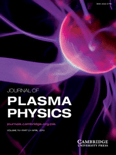
JOURNAL OF PLASMA PHYSICS
Scope & Guideline
Exploring the dynamics of plasma phenomena.
Introduction
Aims and Scopes
- Plasma Dynamics and Stability:
Research on the behavior and stability of plasmas under various conditions, including the study of instabilities, turbulence, and the effects of magnetic fields. - Magnetohydrodynamics (MHD):
Exploration of MHD phenomena, including equilibrium, stability, and dynamics, particularly in fusion devices and astrophysical contexts. - Kinetic and Fluid Models:
Development and application of kinetic and fluid models to describe plasma behavior, including gyrokinetic simulations and fluid dynamics. - Plasma Diagnostics:
Innovations in diagnostic techniques for measuring plasma parameters, including particle and energy transport, and the development of new experimental setups. - Applications of Plasma Physics:
Studies focusing on practical applications of plasma physics, such as in fusion energy, space physics, and materials processing. - Data-Driven Approaches and Machine Learning:
Use of machine learning and data-driven methods to enhance plasma modeling, simulation, and experimental analysis. - Nonlinear Plasma Physics:
Investigation of nonlinear phenomena in plasmas, including wave-particle interactions, turbulence, and self-organization.
Trending and Emerging
- Fusion Plasma Research:
An increasing number of studies are focusing on plasma behavior in fusion devices, particularly in tokamaks and stellarators, driven by the global push for viable fusion energy. - Machine Learning in Plasma Physics:
There is a growing trend towards utilizing machine learning techniques for data analysis, modeling, and simulation in plasma physics, enhancing predictive capabilities. - Multiscale and Multi-Physics Approaches:
Research that combines various scales and physical phenomena, such as coupling kinetic and fluid models, is becoming more prominent, reflecting the complexity of plasma systems. - Advanced Plasma Diagnostics:
New diagnostic techniques, including advanced imaging and spectroscopic methods, are being developed to provide deeper insights into plasma behavior and interactions. - Nonlinear Wave Dynamics:
Studies on nonlinear waves, including solitons and rogue waves in plasmas, are gaining traction, indicating a shift towards understanding complex wave phenomena. - Plasma-Material Interactions:
Research on the interactions between plasmas and materials, especially in the context of fusion reactors and surface engineering, is increasingly recognized for its importance.
Declining or Waning
- Classical Plasma Theory:
Traditional approaches to plasma theory, particularly those based solely on classical mechanics without incorporating modern computational or experimental advancements, are becoming less prevalent. - Dusty Plasma Research:
Although still relevant, the frequency of studies specifically focusing on dusty plasma phenomena has declined, possibly due to a shift towards more complex plasma systems. - Static Models of Plasma Behavior:
Research that relies on static or equilibrium models without considering dynamic or time-dependent behaviors is being phased out in favor of more comprehensive approaches. - Basic Experimental Techniques:
Studies relying on older or less sophisticated experimental techniques are declining as new technologies and methodologies emerge. - Low-Temperature Plasma Physics:
Research on low-temperature plasmas is less frequently published compared to high-energy-density plasmas and fusion-related studies, indicating a potential shift in research priorities.
Similar Journals
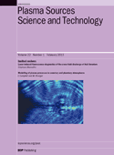
PLASMA SOURCES SCIENCE & TECHNOLOGY
Connecting Researchers with the Latest in Plasma Technology Advancements.PLASMA SOURCES SCIENCE & TECHNOLOGY is a premier academic journal published by IOP Publishing Ltd, focusing on the innovative field of plasma science and its applications in technology. Established in 1992, the journal has significantly contributed to advancing knowledge in this crucial area, maintaining a robust Q1 quartile ranking in Condensed Matter Physics as of 2023, which reflects its high-impact research dissemination. With an impressive Scopus ranking of 74 out of 434 in the field of Physics and Astronomy—specifically within Condensed Matter Physics—this journal stands out as a leading source for researchers and professionals dedicated to the study and application of plasma technologies. While it is not an Open Access journal, the published works are accessible through institutional subscriptions, making them available to a wide academic audience. The journal aims to provide a platform for significant contributions related to plasma physics, fostering scientific dialogue and collaboration across various disciplines. As it continues through its converged years up to 2024, PLASMA SOURCES SCIENCE & TECHNOLOGY remains essential for anyone involved in the burgeoning exploration of plasma-related scientific advancements.

Kinetic and Related Models
Fostering Interdisciplinary Collaboration in Mathematical SciencesKinetic and Related Models, published by the American Institute of Mathematical Sciences (AIMS), is a distinguished journal that focuses on innovative research in the realms of kinetic theory, modeling, and numerical analysis. With an ISSN of 1937-5093 and an E-ISSN of 1937-5077, this journal offers critical insights and advances in mathematical sciences, making significant contributions to both theoretical and practical applications in these fields. As of 2023, it holds a respectable Q2 category ranking in both Modeling and Simulation and Numerical Analysis, reflecting its impact and relevance in the academic community, with Scopus ranks positioning it favorably among its peers. Although it operates through a subscription model, the journal is key for researchers aiming to remain at the forefront of mathematical modeling methodologies and numerical techniques. Established to serve the academic community since 2010, Kinetic and Related Models fosters interdisciplinary collaboration, catering not only to scholars but also to professionals and students looking to deepen their understanding and application of kinetic models in various recent contexts.

Plasma and Fusion Research
Exploring the Frontiers of Plasma Dynamics and Fusion TechnologyPlasma and Fusion Research is a pivotal journal within the realm of plasma science and nuclear fusion, published by the Japan Society of Plasma Science and Nuclear Fusion Research. With an ISSN of 1880-6821, this journal serves as a vital platform for disseminating significant research findings and advancements from Japan and around the globe. Operating since 2006, it has steadily contributed to the field, reflected in its recognition as a Q3 journal in Condensed Matter Physics for the year 2023 and its ranking of #383 out of 434 in the Scopus categories, placing it in the 11th percentile. Although it currently does not offer open access, the journal's commitment to quality research makes it essential reading for researchers, professionals, and students keen on exploring the complexities of plasma dynamics, fusion technology, and their applications in energy production. Situated in Nagoya, Japan, the journal fosters a collaborative environment aimed at pushing the boundaries of knowledge in plasma physics and enhancing the understanding of fusion processes.

JOURNAL OF EXPERIMENTAL AND THEORETICAL PHYSICS
Unveiling the Mysteries of the Physical UniverseJournal of Experimental and Theoretical Physics is a distinguished publication in the field of physics, dedicated to disseminating pioneering research and fostering intellectual discourse in both experimental and theoretical domains. Published by Pleiades Publishing Inc, this journal has established itself as a crucial platform for physicists, with a commendable Q3 categorization in the 2023 rankings within Physics and Astronomy, illustrating its impactful contributions to the discipline. The journal features a wide array of articles that delve into the intricacies of physical theory, experimental techniques, and applications, making it an invaluable resource for researchers, professionals, and students alike. Although it operates under a traditional access model, its longstanding history, dating back to 1980 and converging years through to 2023, underscores its commitment to advancing the frontiers of physics knowledge. The journal is also notable for its engagement in the scientific community, aiming to bridge the gap between theoretical predictions and experimental validations. As a part of Pleiades Publishing, it continues to uphold rigorous standards of academic excellence, inviting contributions that push the boundaries of current understanding and stimulate further exploration in the fascinating world of physics.
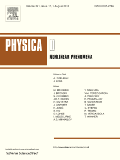
PHYSICA D-NONLINEAR PHENOMENA
Pioneering Research in Nonlinear Dynamics Since 1980PHYSICA D-NONLINEAR PHENOMENA, published by Elsevier, serves as a leading academic journal at the forefront of the fields of Applied Mathematics, Condensed Matter Physics, Mathematical Physics, and Statistical and Nonlinear Physics. With an impressive track record since its inception in 1980, this journal has maintained a distinguished presence, noted for its Q1 ranking in multiple categories in 2023, showcasing its impact and relevance in the scientific community. The journal's commitment to advancing knowledge is reflected not only in its rigorous peer-reviewed articles but also through its high visibility and accessibility, aiding researchers, professionals, and students in staying abreast of the latest developments in nonlinear phenomena. Located in Amsterdam, Netherlands, PHYSICA D-NONLINEAR PHENOMENA is essential for those seeking to explore innovative research and contribute to groundbreaking discoveries in the realm of nonlinear dynamics.
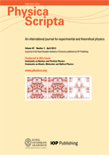
PHYSICA SCRIPTA
Fostering Collaboration for a Brighter Scientific FuturePHYSICA SCRIPTA, established in 1970 and published by IOP Publishing Ltd, is a prestigious journal dedicated to the broad fields of physics, encompassing topics such as atomic and molecular physics, condensed matter physics, and mathematical physics. With an impressive commitment to advancing scientific knowledge, it holds a significant standing in the academic community, evidenced by its Q2 and Q3 rankings across various categories in 2023. The journal is instrumental for researchers, professionals, and students seeking to disseminate and engage with high-quality research, fostering collaboration and innovation within the field. Although it currently does not offer open access options, its robust editorial standards ensure the dissemination of impactful studies, contributing to its rising citation metrics. Published from the United Kingdom, PHYSICA SCRIPTA continues to be a vital resource for contemporary developments in physics, paving the way for future discoveries.
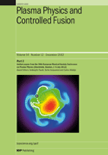
PLASMA PHYSICS AND CONTROLLED FUSION
Leading the Charge in Plasma Science and Nuclear EngineeringPLASMA PHYSICS AND CONTROLLED FUSION is a leading academic journal published by IOP Publishing Ltd that focuses on advancing the understanding of plasma physics and its applications in the field of controlled fusion. Established in 1984, this prestigious journal has earned a significant reputation, demonstrated by its Q1 rankings in both Condensed Matter Physics and Nuclear Energy and Engineering for 2023, alongside impressive Scopus rankings placing it in the 79th percentile in its category. The journal serves as an essential platform for researchers, professionals, and students seeking to stay abreast of cutting-edge developments in plasma behavior, fusion technologies, and theoretical frameworks. While it does not currently offer open access options, the journal's rigorous peer-review process ensures the dissemination of high-quality research that is crucial for the advancement of nuclear energy solutions and the broader field of physics. With its commitment to fostering innovative research and development, PLASMA PHYSICS AND CONTROLLED FUSION is a vital resource for those passionate about the future of energy and scientific exploration.

ACTA PHYSICA SINICA
Fostering Global Collaboration in Physical SciencesACTA PHYSICA SINICA is a prominent journal published by the Chinese Physical Society, dedicated to the dissemination of groundbreaking research in the field of physics and astronomy. Established in 1993, this journal has consistently contributed to the scientific community by publishing high-quality articles that cover a wide range of topics within general physics and related disciplines. Although currently classified in Q4 of the physics and astronomy category by Scopus, ACTA PHYSICA SINICA plays an important role in fostering collaboration and communication among researchers in China and around the world. With a substantial readership, this journal is poised to remain a valuable resource for professionals, researchers, and students alike. By providing in-depth analysis and insights, it aims to advance the understanding and application of physical principles in various technological and scientific advancements. The journal is accessible via subscription, ensuring that contributors and readers can engage with the evolving landscape of physics research. For more information, visit the publisher's website.

Jordan Journal of Physics
Navigating the Frontiers of Physics and AstronomyJordan Journal of Physics is a pivotal scholarly platform published by YARMOUK UNIVERSITY, DEANSHIP RESEARCH & GRADUATE STUDIES, dedicated to the field of physics and its applications. Established in 2008, this journal serves as a crucial avenue for disseminating quality research and insights in various subfields of physics and astronomy. As a publication in the Q4 category per the 2023 metrics, the journal, while currently placed in the lower quartile, offers a unique opportunity for emerging researchers to contribute their findings. With an ISSN of 1994-7607 and a commitment to fostering academic discourse, the Jordan Journal of Physics provides access to original research articles, reviews, and case studies aimed at enriching knowledge and innovation. While it does not presently offer open access, efforts are underway to expand its reach and visibility in the global academic context. Researchers and scholars will find this forum to be an essential resource for advancing their work and connecting with a community dedicated to exploration and understanding of the fundamental principles that govern our universe.

PRAMANA-JOURNAL OF PHYSICS
Fostering Innovation in the Study of the CosmosPRAMANA-JOURNAL OF PHYSICS, published by the esteemed Indian Academy of Sciences, serves as a pivotal platform for disseminating high-quality research in the field of Physics and Astronomy. Established in 1973, this journal aims to promote significant findings in various branches of physics, encapsulating both theoretical and experimental research. With a solid reputation reflected in its Q2 ranking in the Physics and Astronomy (miscellaneous) category and a commendable 94/243 rank in the Scopus database, PRAMANA stands at the forefront of the academic community. Researchers, professionals, and students benefit from its accessible compilation of innovative studies, contributing richly to the scholarly discourse. The journal, operating from its base in Bangalore, India, is committed to advancing knowledge through rigorous peer-reviewed articles, ensuring that all contributions hold merit in expanding our understanding of the physical world.